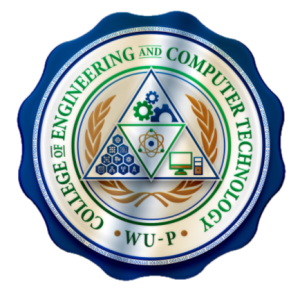
COLLEGE OF ENGINEERING AND COMPUTER TECHNOLOGY
ABOUT COLLEGE OF ENGINEERING AND COMPUTER STUDIES
The College of Engineering (formerly known as the College of Technology) was established due to the increasing awareness of Filipino society toward fast-increasing trends in technology. Its purpose is to provide technically and highly skilled engineering professionals in order to contribute to the demands of the advancing society and to help in its development through Science and Technology. It first offered the General Engineering Course in 1978 which led to the offering of the Bachelor of Science in Electronics and Communications Engineering and the Associate in Electronics and Communications Engineering programs which were granted government recognitions in 1985. Short courses such as the General Radio Communication Operator Course and Automotive were also offered in the 1980s up to the early 1990s.
In the advent of the digital age, the College was also one of the first to offer a Bachelor of Science in Computer Engineering in 1998. In the same year, the College of Technology was identified by the Commission on Higher Education as a Center for Development – 1 for the BSECE program. This enabled the College to integrate AutoCAD and Mechatronics into its curriculum.
In pursuit of academics and establishment of linkages, the College of Engineering is also an active member of the Philippine Association of Engineering Schools (PAES), Inc. since 1990. An academe-industry linkage was made with Smart Communications, Inc. under the Smart Wireless Engineering Education Program (SWEEP) in July 2003 and eventually won 1st Place in the SWEEP Innovation and Excellence Awards in 2005 with the SMART Kiosk, and in 2015 with the Smart – Marketing Assistance and Product Trading or S-MART.
Through the years, it has maintained above the national average in the EcE Board exams and boasts of having produced numerous topnotchers namely; Engr. Leda Celica Samin (3rd Placer) 2008, Engr. Henry F. Martin (13th Placer) 2003, Engr. Richard Fariñas (1st Placer) 2002, Engr. Roel Crisostomo (14th Placer) 2000, Engr. Ronald Fernando (15th Placer) 1994, and Engr. Ross G. Paguinto (7th Placer) 1989.
In 2013, the College of Engineering offered an industry-standard course under the Cisco Networking Academy (WU-P CA) which was integrated into the elective and major courses within the programs of BSCoE and BSEcE. This enables its graduates a competitive edge in the field of Information Communications Technology and Telecommunications.
In 2014, Wesleyan University – Philippines, through the initiative of the College of Engineering, was accredited by the Technical Education and Skills Development Authority (TESDA) as an assessment center for Computer Hardware Servicing NC II and Consumer Electronics Servicing NC II.
In 2015, the 3rd Phase of the implementation and renewal of the partnership with SMART Communications Inc. through the SMART Wireless Engineering Education Program (SWEEP) had taken place and would focus on the development of cloud computing mobile applications, Transmission Control Protocol – Internet Protocol (TCP-IP) trainings, seminars, and Technopreneurship.
Further, the College of Engineering houses the Institute of Electronics Engineers of the Philippines, Inc. (IEcEP), Nueva Ecija, the provincial professional organization of electronics engineers and electronics technicians last 2014 with Accreditation No. 37 from the National Institute of Electronics
Engineers of the Philippines (I-APO No.03) which enables the College to offer Continuing Professional Development (CPD) Training and Seminar to allow participants to earn PRC – CPD points that are required upon renewal of the electronics technicians and electronics engineers license.
The College of Computer Studies, formerly the College of Computer Science, started offering a fouryear Bachelor of Science in Computer Science (BSCS) degree program and a two-year Computer Programming Course in 1994. It produced its first batch of BSCS graduates in 1998.In School Year 2010-2011, the college started to offer Bachelor of Science in Information Technology (BSIT).
Considering the fast-paced nature of information technology education, the curricular programs of the College were designed to be flexible and adaptable to changes and trends in the field while adhering to the standards set by the Commission on Higher Education (CHED).
The college is continuously finding ways to further improve the delivery of quality computer education through a well-rounded curriculum, trained and proficient instructors, and up-to-date facilities to guarantee that its graduates will be computer professionals at the forefront of technological innovation and advancement.
The College of Engineering and the College of Computer Studies were separate colleges that were merged under the administration of Hon. Pacifico B. Aniag. The merger was named College of Engineering and Computer Technology (CECT) effective SY 2017-2018.
The College of Engineering and Computer Technology had since proven the quality of education and instruction in the college as it had been bagging awards and recognition in various competitions at the regional and national levels such as the ones sponsored by the Department of Science and Technology, Smart Communications, Inc., the respective accredited professional organizations of the college’s programs, especially excelling in the field of research and innovations.
MISSION AND VISION

